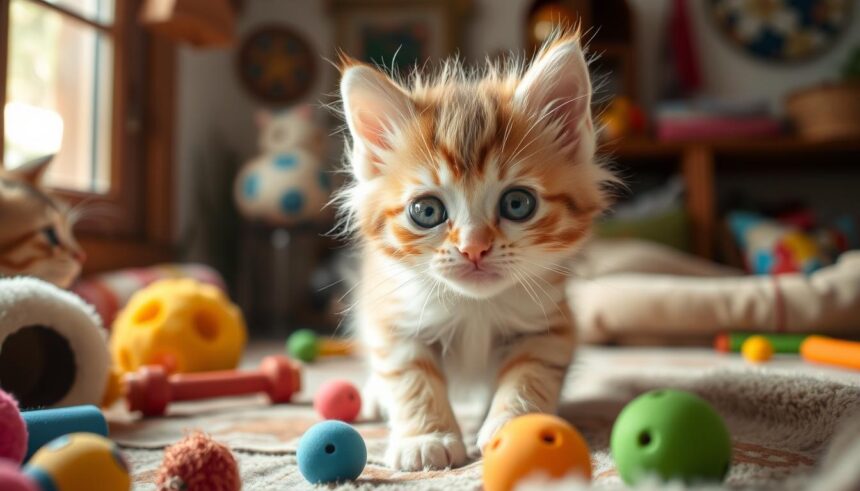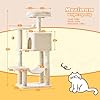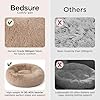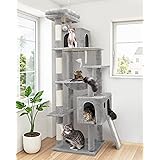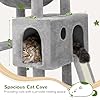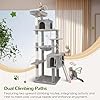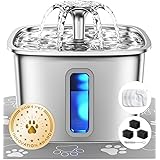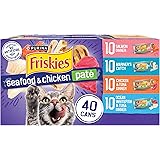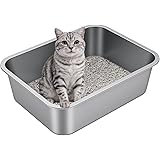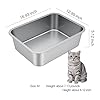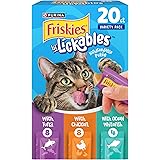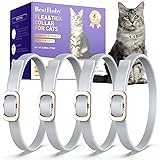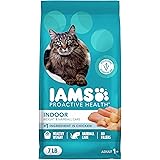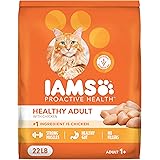Kittens at 12 weeks are still growing and need the right care. As a pet owner, knowing about kitten development stages is key. They need attention, socialization, and the right food to grow well.
Good care for kittens includes a safe place to play, healthy food, and vet visits. Knowing about kitten growth helps spot health problems early. Kittens need vaccinations to stay safe from diseases.
Key Takeaways
- Provide a safe and stimulating environment for your 12 week old kitten
- Follow a balanced diet and feeding schedule to ensure healthy growth
- Understand the different kitten development stages to identify potential health issues
- Schedule regular veterinary check-ups to ensure your kitten’s health and well-being
- Start kitten socialization early to promote good behavior and reduce stress
- Ensure proper rest and nutrition for your kitten’s overall health and development
- Follow the feeding guides on kitten food packaging to ensure healthy weight gain
Understanding Your 12 Week Old Kitten’s Development Stage
At 12 weeks, kittens are growing fast. They learn to move around, play, and connect with people. Knowing about kitten development stages helps you care for them well. They start to be more independent and need both freedom and guidance.
Kittens show different behaviors as they grow. A 12 week kitten might be more playful and curious. It’s important to watch these signs to make sure they’re growing right.
Amazon Echo Show 5 (newest model), Smart display, Designed for Alexa+, 2x the bass and clearer sound, Charcoal
$89.99 (as of March 1, 2026 08:19 GMT +00:00 – More infoProduct prices and availability are accurate as of the date/time indicated and are subject to change. Any price and availability information displayed on [relevant Amazon Site(s), as applicable] at the time of purchase will apply to the purchase of this product.)Sweetcrispy 44 Inch Cat Tree Tower, Cat Climbing Tower with Natural Sisal Scratching Posts, Hammock, Pet Condo for Indoor Cats and Kittens Play, Beige
$29.98 (as of February 28, 2026 20:33 GMT +00:00 – More infoProduct prices and availability are accurate as of the date/time indicated and are subject to change. Any price and availability information displayed on [relevant Amazon Site(s), as applicable] at the time of purchase will apply to the purchase of this product.)Bedsure Calming Dog Bed Medium Size Dog – Donut Washable Medium Pet Bed, 30 inches Anti-Slip Round Fluffy Plush Faux Fur Cat Bed, Fits up to 45 lbs Pets, Camel
$42.49 (as of March 1, 2026 08:19 GMT +00:00 – More infoProduct prices and availability are accurate as of the date/time indicated and are subject to change. Any price and availability information displayed on [relevant Amazon Site(s), as applicable] at the time of purchase will apply to the purchase of this product.)Globlazer Heavy Duty Cat Tree, 70 inch Sturdy Cat Tree for Indoor Cats Extra Large Cat Tower with Scratching Post, Hammock, Cat Condo for Adult Cats Kittens, F70 Pro, Light Grey
$94.99 (as of February 28, 2026 18:31 GMT +00:00 – More infoProduct prices and availability are accurate as of the date/time indicated and are subject to change. Any price and availability information displayed on [relevant Amazon Site(s), as applicable] at the time of purchase will apply to the purchase of this product.)Purina Friskies Wet Cat Food Variety Pack, Tasty Treasures Prime Filets (With Ocean Fish and Tuna, With Chicken and With Turkey) – 5.5 Ounce (Pack of 12)
$10.07 (as of February 28, 2026 18:31 GMT +00:00 – More infoProduct prices and availability are accurate as of the date/time indicated and are subject to change. Any price and availability information displayed on [relevant Amazon Site(s), as applicable] at the time of purchase will apply to the purchase of this product.)Veken Innovation Award Winner Stainless Steel Cat Water Fountain, 108oz/3.2L Automatic Pet Fountain Dog Water Dispenser with 3 Replacement Filters & Silicone Mat, Gifts for Cats, Dogs (Silver)
$26.99 (as of February 28, 2026 18:31 GMT +00:00 – More infoProduct prices and availability are accurate as of the date/time indicated and are subject to change. Any price and availability information displayed on [relevant Amazon Site(s), as applicable] at the time of purchase will apply to the purchase of this product.)Purina Friskies Dry Cat Food Seafood Sensations With Salmon, Tuna, and Shrimp Flavors – 22 lb. Bag
$21.28 (as of March 1, 2026 08:19 GMT +00:00 – More infoProduct prices and availability are accurate as of the date/time indicated and are subject to change. Any price and availability information displayed on [relevant Amazon Site(s), as applicable] at the time of purchase will apply to the purchase of this product.)Self Warming Cat Bed Self Heating Cat Dog Mat 24 x 18 inch Extra Warm Thermal Pet Pad for Indoor Outdoor Pets with Removable Cover Non-Slip Bottom Washable Non Electric
$19.77 (as of February 28, 2026 18:31 GMT +00:00 – More infoProduct prices and availability are accurate as of the date/time indicated and are subject to change. Any price and availability information displayed on [relevant Amazon Site(s), as applicable] at the time of purchase will apply to the purchase of this product.)Purina Friskies Pate Wet Cat Food Variety Pack Seafood and Chicken Pate Favorites 40ct VP – (Pack of 40) 5.5 oz. Cans
$32.76 (as of February 28, 2026 18:31 GMT +00:00 – More infoProduct prices and availability are accurate as of the date/time indicated and are subject to change. Any price and availability information displayed on [relevant Amazon Site(s), as applicable] at the time of purchase will apply to the purchase of this product.)Interactive Cat Toy for Indoor Cats – Automatic Moving & Enrichment Toy for Indoor Cats/Kitten, Auto/Manual Control Cat Treadmill for Exercise & Mental Stimulation, Stimulating Chase Toys (H1K2)
$42.97 (as of February 28, 2026 20:33 GMT +00:00 – More infoProduct prices and availability are accurate as of the date/time indicated and are subject to change. Any price and availability information displayed on [relevant Amazon Site(s), as applicable] at the time of purchase will apply to the purchase of this product.)Some important kitten development stages at 12 weeks include:
- Physical development: kittens should be able to run, jump, and play actively
- Mental development: kittens should be able to problem-solve and learn basic commands
- Social development: kittens should be able to interact with their human family and other animals
Knowing about kitten growth milestones and 12 week kitten behavior helps you care for your kitten. Always talk to a vet for advice on raising your kitten.
Physical Characteristics of a 12 Week Kitten
A 12 week kitten is usually 6-8 inches long and weighs 2-4 pounds. Their kitten physical development is still in progress. This includes their coat, eyes, and ears. It’s important to watch their growth and make sure they eat well and stay healthy, as kitten development guidelines suggest.
Kittens at 12 weeks grow fast, and their 12 week kitten weight can change. Things like breed, diet, and health affect their size and weight. Keeping an eye on their 12 week kitten size and weight is key to their healthy growth.
- Coat: Their fur is still developing, and they may shed their baby coat
- Eyes: Their eyes are fully open, and they can see clearly
- Ears: Their ears are fully developed, and they can hear well
Knowing about a kitten’s physical traits at 12 weeks helps owners care for them better. By watching their kitten physical development and adjusting their care, owners can help their kitten grow into a healthy cat.
Essential Feeding Guidelines for Your Growing Kitten
At 12 weeks old, your kitten needs a balanced diet. A high-quality 12 week kitten food is key for their growth. It’s important to follow a kitten feeding schedule to ensure they get the right nutrients.
Kittens at this age should eat 3-4 times a day. The amount of food should match their weight. Experts say kittens should eat about 30-50 grams of food per meal. Here are some key points to consider:
Idymere Stainless Steel Litter Box with High Sided, Metal Cat Litter Box, Odor-Free, Non-Stick Litterbox Pan, Easy to Clean Pet Supplies Toilet Tray for Indoor Cats, Kittens or Multicat Homes
$18.59 (as of February 28, 2026 18:31 GMT +00:00 – More infoProduct prices and availability are accurate as of the date/time indicated and are subject to change. Any price and availability information displayed on [relevant Amazon Site(s), as applicable] at the time of purchase will apply to the purchase of this product.)Purina Friskies Lil’ Lickables with Chicken, with Tuna or with Ocean Whitefish Variety Pack Lickable Cat Treats – 10 oz. (Pack of 20)
$10.99 (as of March 1, 2026 03:48 GMT +00:00 – More infoProduct prices and availability are accurate as of the date/time indicated and are subject to change. Any price and availability information displayed on [relevant Amazon Site(s), as applicable] at the time of purchase will apply to the purchase of this product.)WORLD’S BEST CAT LITTER Multiple Cat Unscented, 15-Pounds – Natural Ingredients, Quick Clumping, Flushable, 99% Dust Free & Made in USA – Long-Lasting Odor Control & Easy Scooping
$19.15 (as of February 28, 2026 20:33 GMT +00:00 – More infoProduct prices and availability are accurate as of the date/time indicated and are subject to change. Any price and availability information displayed on [relevant Amazon Site(s), as applicable] at the time of purchase will apply to the purchase of this product.)Greenies Cat Treats, Feline Veterinarian-Recommended Adult Natural Dental Cat Treats, Oven Roasted Chicken Flavor, 9.75 oz. Tub
$10.99 (as of February 28, 2026 18:31 GMT +00:00 – More infoProduct prices and availability are accurate as of the date/time indicated and are subject to change. Any price and availability information displayed on [relevant Amazon Site(s), as applicable] at the time of purchase will apply to the purchase of this product.)Flea and Tick Collar for Cats (4 Pack), Plant-Powered with Natural Essential Oils, Water-Resistant, Adjustable for All Cats & Kittens (Gray)
$23.99 (as of February 28, 2026 20:33 GMT +00:00 – More infoProduct prices and availability are accurate as of the date/time indicated and are subject to change. Any price and availability information displayed on [relevant Amazon Site(s), as applicable] at the time of purchase will apply to the purchase of this product.)IAMS Proactive Health Dry Cat Food, Indoor Weight and Hairball Care Cat Food Dry Recipe, with Real Chicken in Every Bite, 7 lb. Bag
$16.97 (as of February 28, 2026 18:31 GMT +00:00 – More infoProduct prices and availability are accurate as of the date/time indicated and are subject to change. Any price and availability information displayed on [relevant Amazon Site(s), as applicable] at the time of purchase will apply to the purchase of this product.)Jilca Cat Deterrent Spray, Cat Repellent Indoor and Outdoor, Cat Deterrent for Furniture Protection, Pee Spraying, Excessive Chewing & Scratching Everywhere, Pet-Safe Formula, 5.07 Fl Oz
$16.99 (as of February 28, 2026 20:33 GMT +00:00 – More infoProduct prices and availability are accurate as of the date/time indicated and are subject to change. Any price and availability information displayed on [relevant Amazon Site(s), as applicable] at the time of purchase will apply to the purchase of this product.)Purina Fancy Feast Grilled Wet Cat Food Seafood Collection in Wet Cat Food Variety Pack – (Pack of 24) 3 oz. Cans
$22.86 (as of March 1, 2026 08:19 GMT +00:00 – More infoProduct prices and availability are accurate as of the date/time indicated and are subject to change. Any price and availability information displayed on [relevant Amazon Site(s), as applicable] at the time of purchase will apply to the purchase of this product.)Purina Friskies Gravy Wet Cat Food Variety Pack, Surfin’ and Turfin’ Prime Filets Favorites – (Pack of 40) 5.5 oz. Cans
$32.76 (as of March 1, 2026 08:19 GMT +00:00 – More infoProduct prices and availability are accurate as of the date/time indicated and are subject to change. Any price and availability information displayed on [relevant Amazon Site(s), as applicable] at the time of purchase will apply to the purchase of this product.)IAMS Proactive Health Dry Cat Food, Healthy Cat Food Dry Recipe for Adults, with Chicken 22 lb. Bag
$39.98 (as of February 28, 2026 18:31 GMT +00:00 – More infoProduct prices and availability are accurate as of the date/time indicated and are subject to change. Any price and availability information displayed on [relevant Amazon Site(s), as applicable] at the time of purchase will apply to the purchase of this product.)- Kittens need 30-40% of their daily calories from high-quality protein.
- Fats should make up about 20-30% of their daily calories.
- A typical portion size for kittens is 30 to 50 grams per meal.
It’s also important to add omega-3 fatty acids and taurine to their diet. Aim for about 250-500 milligrams of taurine per day for an average-sized kitten. Also, consider adding 1000mg of fish oil per day for small breeds and up to 3000mg per day for larger breeds.
By following these feeding guidelines for kittens and using high-quality 12 week kitten food, you can help your kitten grow and thrive. Always talk to your vet to find the best kitten feeding schedule for your kitten.
| Age | Feeding Frequency | Portion Size |
|---|---|---|
| 2-6 months | 3-4 times a day | 30-50 grams per meal |
| 6-12 months | 2-3 times a day | 50-70 grams per meal |
Proper Weight and Growth Expectations
At 12 weeks old, kittens should weigh between 2-4 pounds. They grow steadily. It’s important to check their weight to make sure they’re healthy. Proper weight for kittens helps avoid health problems.
Genetics, nutrition, and parasites can influence a kitten’s growth. Regular vet visits are key to tracking their weight. This ensures they grow at a healthy pace.
Kittens usually double their birth weight by the first week. By 12 weeks, they are full of energy and playful. It’s crucial to monitor their weight and adjust their food accordingly.
Here are some key kitten growth milestones to remember:
- Four-week-old kittens weigh between 12 ounces to 1.3 pounds
- Eight-week-old kittens double their weight compared to their fourth week
- Kittens usually start eating solid food around the ninth week
Regular weight checks help spot any growth issues early. This ensures they reach their ideal weight and size. Knowing the 12 week kitten weight and growth expectations helps owners care for their kitten better.
| Age | Weight |
|---|---|
| 4 weeks | 12 ounces – 1.3 pounds |
| 8 weeks | 1-2 pounds |
| 12 weeks | 2-4 pounds |
Vaccination Schedule and Health Requirements
At 12 weeks old, kittens need core vaccinations as part of their kitten health requirements. The vaccination schedule for kittens starts with the first dose at 6-8 weeks. Then, they get boosts every 3-4 weeks until they are 16-20 weeks old.

- 🐱 【Multifunctional Activity Center】The cat Tree provides 3 top perches platforms and two cozy condo. Whether your kitten wants to stretch out on a spacious perch, curl up in a plush hole room, or release the urge to scratch on a sisal pole, this multifunctional cat tree tower works perfectly as a recreation paradise,which can make your fur baby's day full of fun and excitement!two toys gives them a unique way and Fun to play!
- 🐱【 Large Space Vertical】Because of its compact footprint and ability to conserve floor space, the cat tree design offers a large amount of vertical space. Every cat can have their own zone thanks to the cat jumping platform, which is another way that modern cat trees promote indoor cat peace. Maximum Load Capacity: 44 lbs. If your cat is too big for this cat tree, please buy one for tiny and medium-sized cats!
- 🐱 【Stable Construction】Our Cat Tower is made of high-quality particle board with skin friendly plushy faux-fur cover to keep your cat warm and comfortable. The cat activity tree has a wall anchor strap which provides a good double security protection. You don't have to worry that the cat tree will overturn or shake accidentally.Give your cat the best protection!ideal for average kittens and cats.
- 🐱 【Posts for Scratching Covered in Sisal 】These are scratching surfaces that are integrated into the framework. Cats love to bury their claws in sisal because it's a sturdy substance with a coarse texture. Our cat tree promotes healthy scratching habits and helps discourage cats from damaging furniture by offering dedicated spaces for them to scratch.
- 🐱 【Simple assembly】We understand that convenience is important to pet owners, which is why we made our cat tree simple to assemble in a matter of minutes. You can quickly provide your kitties a stimulating environment by following the simple setup instructions and using the available tools. Please feel free to contact us with any questions you may have about our cat tree, and we will respond to you within a day!

- Teething Fun: Ideal for kittens and cats alike, these chew toys are an essential addition to your kitty’s dental care. With natural gall fruit and rope design, the toys are perfect for teething and teeth cleaning, they combat tartar and freshen breath, making dental hygiene a fun activity for your little one!
- Infused with Catnip Aroma: The included catnip bag emits a soothing aroma that's irresistible to felines, ensuring these toys are a calming and engaging presence for indoor play. Our cat toys provide the calming, meow-inducing fun every kitten craves, along with a funny and interactive experience.
- Energetic Exercise: Promote healthy exercise and self-play with our toys' appealing textures and tassels. They’re designed to entice your kitty to bite and play aggressively without harm, offering hours of exercise and self-amusement, keeping your cat active and happy.
- Quiet Play: These soft colorful ropes provide enriching quiet playtime without bothering cat owner's sleep or life. Your kitty will love the funny snake-like shapes, enhancing their playtime with every pounce and bite.
- Safe and Organic: These chew toys, handcrafted without any metal wire and using organic cotton rope, are safe for all cats. Paired with a reusable catnip bag, they’re an essential, eco-friendly addition to your cat’s enrichment collection.

- MADE WITH WHOLESOME INGREDIENTS YOU CAN TRUST: Every Inaba product is made with yummy ingredients including farm-raised chicken and/or wild-caught tuna
- KEEP OUR FELINE HYDRATED WITHOUT ADDING CALORIES: Each delicious, creamy Churu tube contains 91% moisture and only 6 calories (a tenth of the calories of traditional dry cat treats), which makes it a healthy snack you can feel good about feeding
- FREE OF THE BAD STUFF: Your feline friend is important to us, which is why we've kept things like grains, preservatives, artificial colors and carrageenan out of our cat treats, but we added things like Vitamin E for immunity
- HAVE THEM EATING OUT OF YOUR HAND: These lickable purée meat tubes for cats were designed to be fed by hand, as an interactive way to spend time with your feline, but you can use as a wet/dry cat food topper or as a way to disguise medication
- ADD SOME VARIETY TO YOUR CAT'S LIFE: Available in eleven savory flavors, cats of all stages (kitten to senior) will be able to find a flavor they love

- FREEZE-DRIED RAW MINNOWS CAT TREAT: Vital Essentials Freeze Dried Cat Treats pack more protein than industry standard into every bite to deliver the peak vitality your dog deserves. Our natural freeze-dried raw cat treats are made from responsibly sourced premium minnows.
- BETTER PROTEIN = BETTER BENEFITS: The best freeze dried cat treats on the market use premium butcher cut raw protein to unlock the benefits of naturally occurring vitamins and minerals in raw muscle and organs, because pets deserve the energetic playtimes, healthy skin, shiny coats, strong teeth, and essential gut health that a high-protein diet delivers.
- PROUDLY AMERICAN CRAFTED: All our cat treats and food are responsibly sourced and humanely harvested to ensure the quality of our proteins. We go above industry standards to preserve flavor and ensure the highest quality of protein and nutrients in every Vital Essentials product.
- MADE WITHOUT: Cat treat additives, fillers, dyes, flavorings, artificial preservatives, grains, or rendered by-products. Vital Essentials also offers the widest variety of single-protein raw cat food and treats on the market—great for picky eaters and cats with allergies!
- RAW CAT TREATS FREEZE DRIED FOR PEAK FRESHNESS: Our protein is frozen within 45-minutes of harvesting to lock in peak nutrients, flavor, and freshness. A slow-freeze-dry ensures minimal processing, while preserving the vital nutrients that our pets deserve, the way nature intended.

- Cats Lose Their Cool: Just shake the pack, and your favorite feline will come running for their favorite cat treats
- Purr-fect Texture: Cat treats are crunchy on the outside and soft on the inside, making it the cat snack that keeps them coming back
- Under 2 Calories Per Treat: Each cat treat is under 2 calories, so these little crunchy goodies make the perfect snack or reward that can be given daily
- Trifecta of Tempting Cat Treats: Catnip Fever is a delicious cat snack with a mix of chicken, catnip, and cheese flavors your cat will love
- Value-Sized, Resealable Tub: Treat ’em again and again using the resealable tub that is perfect for keeping cat paws off when you’re not watching

- Award-Winning Product. Veken is proud to be a 2024 Category Winner of the Pet Innovation Awards, an honor given to only the most forward-thinking products within the rapidly expanding Pet industry.
- Upgraded Stainless Steel. Opt for a stronger, more hygienic version of our best selling pet fountain. Easy to clean and BPA-free, our stainless steel design offers the elevated and modern look you want with additional benefits.
- Large Capacity Water Tank. Worry less about your furry friend running out of water. Our pet fountain features a generously sized water reserve tank to help you avoid frequent refilling, ensuring your pets are healthy, hydrated, and happy.
- Advanced 5-Stage Filtration. Our upgraded system with silver, scale inhibitors, and activated carbon delivers fresh, clean water for up to 3 weeks. For optimal performance and your pet’s health, we recommend using softened or filtered water.
- LED Light Feature. Illuminate your pet’s favorite drinking spot with our optional on/off light feature. Designed for assisted visibility of water level and fountain location, our gentle light is perfect for avoiding spills and easy refilling.

- 4-in-1 Monitoring Tools: Sealed, hygienic strips for comprehensive cat wellness indicator checks.
- Simple At-Home Use: User-friendly steps with clear guidance—no professional training needed.
- Quick Readings: Obtain consistent readings at home in 10-20 minutes to stay attentive to your cat’s needs.
- Gentle and Non-Intrusive: Designed for minimal stress, using easy sample collection (feces/swabs) suitable for cats.
- Hygienic Components: Individually sealed tools and pre-measured solution for clean, safe use at home.

- 【Interactive Cat Toys】High quality aluminum alloy shell which equipped with metal clip design and three adjustment modes, only need to slide adjustment, no need to long press,in addition,Interactive cat toys mini size and easy to carry, easily put this cat toys in your pocket or bag, use it anytime and anywhere for added.
- 【7 In 1 Modes】This cat toys has 5 patterns: red dot, mice, butterfly, smile face, star. Scoll the black gear on the head to change to 3 different modes: red, purple, white. You can use the purple to check couterfeit currency and check your pets. White mode can be used for emergency lighting. The red mode can be used to play with your cat or for PowerPoint presentation.
- 【Indoor Play】Excellent interactive cat toys can not only bring endless fun, but also exercise the pet's body and agility.Can provide exercise and endless fun,This exercise chaser toy can satisfy the curiosity and playfulness of your cat.
- 【USB Direct Charging】Unplug the back cover and connect the charging head to charge it. It does not need dry battery and is environmentally friendly.
- 【Gifts for Your Pets】With this cat toys, your pet will not feel lonely, but also can enhance the relationship between you and your pet, It's the best gift for pets.

- Unique and Funny Design: These cute plush cat toys are designed to look like knives, creating a hilarious contrast with your kitty's playful nature. Perfect for indoor play, they will bring endless amusement to both you and your cat.
- Multiple Attractions: Filled with organic catnip and silvervine, these toys make cats excited and playful. The crinkle paper inside adds an extra layer of fun, making engaging sounds that entice your kitty to play and exercise.
- High-Quality and Safe: Made from durable materials, these toys are designed to withstand biting and clawing. The high-quality catnip is sun-dried and packaged in a non-woven bag, ensuring a long-lasting, refreshing scent that keeps your cat coming back for more.
- Interactive and Engaging: These toys provide great enrichment for your cat's life, promoting exercise and interactive play. The crinkle sound and realistic design keep your kitty engaged and stimulated, preventing boredom and promoting healthy activity.
- Calming and Cuddly: Perfect for self-play and calming your cat, these plush toys are soft and safe for your kitty to cuddle and bite. The combination of catnip and silvervine provides a soothing effect, making them an essential addition to your cat's toy collection.

- Friskies Prime Filets wet cat food made with real meat, poultry or seafood. Savory sauce or gravy for cats adds flavor and moisture
- Shredded soft cat food chunks offer a tempting texture. Provides 100 percent complete and balanced nutrition for adult cats
- Multi-can Friskies canned cat food variety pack makes it easy to stock your pantry. Contains essential vitamins and minerals in every serving
- Enticing, moist cat food aroma tempts her to her dish. Checked for quality and safety to provide added peace of mind
- Canned cat food variety pack formulated to meet or exceed industry standards for cat food
The core vaccinations include feline rhinotracheitis, calicivirus, and panleukopenia. Optional vaccines like FeLV and FIV might also be suggested. It’s key to stick to the 12 week kitten vaccinations schedule to keep your kitten safe from diseases.
Keeping an eye on your kitten’s health is vital. Watch their appetite, stool quality, and behavior. Regular vet visits are also important to keep up with the vaccination schedule for kittens and catch any health issues early.
By following the 12 week kitten vaccinations and kitten health requirements, you can protect your kitten from serious diseases. This ensures they have a happy and healthy life.
Managing Your Kitten’s Sleep Schedule
Kittens at 12 weeks old sleep a lot, about 16-18 hours a day. It’s key to have a routine and a cozy, safe spot for them to sleep. Managing kitten sleep is vital for their growth. Their sleep schedule can be affected by when they eat and play.
For good sleep habits, give your kitten a special sleeping spot. Feeding them before bed helps them sleep well. Playing with them during the day helps them use up energy and sleep better at night. It’s also smart not to wake up for them at night to stop them from getting used to it.
Here are some tips for managing kitten sleep:
- Establish a regular feeding schedule to help regulate sleep patterns
- Provide a comfortable and safe sleeping environment
- Engage kittens in play and enrichment activities during the day
- Avoid responding to nocturnal disturbances to prevent reinforcement of nighttime waking behavior
By following these tips and understanding the importance of kitten sleep schedule, you can help your kitten develop healthy sleep habits. This ensures they get enough rest for their growth.
Independent Living Skills at 12 Weeks
At 12 weeks old, kittens start learning to live on their own. They learn 12 week kitten litter box training and kitten self-grooming. These skills help them grow into healthy, happy adult cats.
Learning to use the litter box and groom themselves makes kittens more confident. They become more independent and self-sufficient.
It’s important for kittens to develop independent living skills. Kittens that are handled and socialized well tend to learn these skills better. Here are some key points to consider:
- Kittens should be encouraged to use the litter box regularly, with positive reinforcement and rewards for successful uses.
- Kitten self-grooming should be supported and encouraged, as it helps to develop good hygiene habits and reduces the risk of health problems.
- Providing a safe and comfortable environment for kittens to play and explore is essential for their development of independent living skills for kittens.
By supporting and encouraging these independent living skills, kitten owners can help their pets develop into happy, healthy, and well-adjusted adult cats.
| Age | Average Weight |
|---|---|
| Newborn | 1.8–5.3 ounces (50–150 grams) |
| 1 week | 5.3–8.8 ounces (150–250 grams) |
| 2 weeks | 8.8–12.3 ounces (250–350 grams) |
Exercise and Play Requirements
At 12 weeks old, kittens need regular exercise and play to grow strong and smart. They can jump high, sometimes up to 3-4 times their own height. It’s key to give them a safe place to explore and play.
Interactive toys and games are great for a 12 week kitten. Think feather wands, laser pointers, and food puzzle toys. Play with your kitten 2-3 times a day, for 10-15 minutes each time. This helps them learn important skills like hunting and solving problems.
Some fun 12 week kitten exercise ideas include:
- Chasing toys or strings
- Climbing and jumping on cat trees or furniture
- Playing with food puzzle toys or interactive games
Also, make sure your kitten eats well. Feed them 3-4 meals a day, mixing wet and dry food. Talk to your vet to find the best food for your kitten.
Always watch your kitten during playtime to keep them safe. With enough exercise and play for kittens, they’ll grow into happy, healthy cats.
| Age | Exercise and Play Requirements |
|---|---|
| 12 weeks | 2-3 play sessions per day, 10-15 minutes each |
| 6 months | 1-2 play sessions per day, 10-15 minutes each |
Dental Development and Teething Care
At 12 weeks old, kittens are going through a lot with their kitten dental development, including teething. It’s key to keep an eye on their dental health and give them the right teething care for kittens. Kittens are born without teeth but get a full set of 26 baby teeth by 8 weeks. As they grow, these baby teeth fall out, and adult teeth take their place, with all 30 adult teeth in by 6 months.
Signs that a kitten is teething include new teeth coming in, acting differently, eating problems, drooling, bad breath, and wanting to chew a lot. To help with teething pain, kittens might like chew toys or a cold washcloth. If they’re having trouble eating, try wet food. It’s better for them because it has more protein and water.
Here are some tips for 12 week kitten teeth care:
- Give them soft food and playtime to ease teething pain
- Try ice cubes made from low/no-salt chicken broth or tuna juice
- Start brushing their teeth with cat-safe toothpaste daily
- Use dental care products like wipes, rinses, and pads every day
It’s important to take your kitten to the vet every 3-4 weeks from 6-8 weeks old until 16-18 weeks old. This helps keep an eye on their dental health and development. By following these tips and giving your kitten the right teething care for kittens, you can help their 12 week kitten teeth grow strong and healthy.
| Age | Dental Development |
|---|---|
| 8 weeks | 26 baby teeth fully in place |
| 12 weeks | Teething begins, baby teeth start to fall out |
| 6 months | Full set of 30 adult teeth typically in place |
Common Health Concerns to Watch For
At 12 weeks old, kittens face health issues like diarrhea and upper respiratory infections. Keeping an eye on a kitten’s 12 week kitten health is key to spotting and fixing problems early. The American Animal Hospital Association says kittens should see a vet soon after adoption, ideally within 10-14 days.
Kittens can also get intestinal worms, coccidia, and fleas. These parasites lead to symptoms like diarrhea, loss of appetite, and itching. It’s vital for owners to know about kitten health concerns and prevent them. This includes a balanced diet and a clean living space. For more kitten care tips, check out kitten care resources.
Here are some common health issues to watch for:
- Upper respiratory infections
- Feline distemper (panleukopenia)
- Intestinal worms
- Coccidia
- Fleas
Regular vet visits and care can catch health problems early. Knowing about common health issues in kittens and acting fast helps keep them healthy and happy.
| Health Concern | Symptoms | Prevention |
|---|---|---|
| Upper respiratory infections | Sneezing, runny eyes | Vaccination, good hygiene |
| Feline distemper (panleukopenia) | Diarrhea, vomiting | Vaccination, quarantine |
| Intestinal worms | Diarrhea, weight loss | Regular worming, good hygiene |
Kitten-Proofing Your Home
Kitten-proofing is key to keeping your kitten safe and avoiding dangers. At 12 weeks, kittens are full of curiosity and love to explore. It’s vital to make their environment safe and fun.
Just like baby-proofing, kittens are drawn to moving things and like to chew on them. You’ll need to get them scratching posts, litter boxes, and toys that are kitten-safe. Also, make sure to keep cords and strings away from them to avoid choking hazards.
Home safety for kittens means keeping harmful items like antifreeze or cleaning supplies out of their reach. This is crucial for their health.
- Keep toxic substances out of reach
- Secure loose items, such as cords or strings
- Provide essential equipment, such as scratching posts and litter boxes
- Supervise kittens during playtime to prevent accidents
By following these steps, you can make a safe and joyful space for your kitten. Remember, kitten-proofing is a continuous effort. It’s important to stay vigilant to keep your kitten safe and happy.
Socialization and Behavioral Training
Kitten socialization is key when they are between 12-16 weeks old. This is when they learn social skills and form their personalities. Training them helps avoid bad behaviors and strengthens the bond with their owner. It’s important to expose them to different people, sounds, and places to make them confident and calm.
Experts say kittens learn and socialize best until they are 12-16 weeks old. It’s vital to give them positive experiences during this time. Handling them gently, exposing them to various textures and sounds, and giving them lots of playtime are good tips.
Here are some more tips for socializing kittens:
- Touch their heads, feet, mouths, and tummies to get them used to human contact
- Expose them to various situations and handling to help them associate positivity with new experiences
- Keep new experiences short (10-15 minutes) and positive to avoid overwhelming or stressing them
Being consistent with training routines helps kittens learn faster and feel less stressed. By following these tips and training them properly, your kitten will grow into a well-adjusted and well-behaved cat.
| Age | Socialization Tips |
|---|---|
| 4-17 weeks | Expose to novel stimuli, people, sounds, and textures |
| 12-16 weeks | Continue socialization, introduce new experiences, and reinforce positive behavior |
Nutrition and Dietary Requirements
At 12 weeks old, kittens need a balanced diet for growth and health. Proper nutrition is key for their overall well-being. The American Association of Feed Control Officials (AAFCO) says kitten food should be complete and balanced. This means no need for extra vitamins or minerals.
A good 12 week kitten nutrition plan includes both wet and dry food. Each type has its own benefits. Wet food is tasty and has lots of moisture. Dry food helps keep teeth clean and keeps kittens active.
Also, dry food is more affordable. For more details on kitten feeding, check out the kitten feeding chart. It explains what kittens need at different ages.
Kittens have different dietary needs based on their age, weight, and individual health. They should eat at least three or four times a day. Protein should make up about 30% of their diet. Knowing what kittens need helps owners give them a great start in life.
| Age | Weight | Calories per day |
|---|---|---|
| 2 months | 2 pounds | 150 |
| 4 months | 4.5 pounds | 300 |
| 8 months | 7.5 pounds | 440 |
Signs of Normal vs Abnormal Development
At 12 weeks old, kittens are growing fast. They are learning and changing a lot. 12 week kitten development is very important. Knowing the signs of normal vs abnormal development helps them grow right.
Kittens should play, pounce, and wrestle with others. They should also listen to sounds and explore. But, if they don’t eat well, have bad stool, or act strange, it might be a problem. For example, kittens that are not gaining weight or seem tired might not be developing right.
Here are some key indicators of normal and abnormal development in kittens:
- Normal urine color: pale yellow
- Normal stool quality: well-formed and brown
- Normal heart rate: 220-300 beats per minute
- Abnormal signs: vomiting, diarrhea, or lethargy
Watching for these signs and talking to a vet if worried is key. By keeping an eye on 12 week kitten development, you can make sure your kitten stays healthy and happy.
Every kitten is unique. What’s normal for one might not be for another. If you’re unsure about your kitten’s growth, always talk to a vet for advice.
| Age | Normal Development | Abnormal Development |
|---|---|---|
| 6-8 weeks | Playing, pouncing, and wrestling | Lethargy, vomiting, or diarrhea |
| 12 weeks | Exploring surroundings, responding to sounds | Changes in appetite, stool quality, or overall behavior |
Building a Daily Care Routine
A daily care routine is key for kittens’ growth and health. At 12 weeks, they need a routine with regular feeding, play, and sleep. This routine gives them structure and helps them grow.
In the morning, morning care tasks for kittens include feeding, cleaning the litter box, and play. Make sure they have fresh water and a clean litter box all day. In the evening, evening care requirements for kittens include another meal, play, and getting ready for bed.
A good daily routine also includes grooming and vet visits. Regular grooming and vet check-ups keep them healthy. Following a routine helps your kitten develop good habits for a happy life.

- Feeding: 2-3 times a day, depending on the kitten’s age and breed
- Playtime: at least 1-2 times a day, to provide physical activity and mental stimulation
- Sleep: 12-16 hours a day, to ensure your kitten gets enough rest
- Grooming: regular brushing and nail trimming to prevent matting and tangling
By adding these to your kitten’s daily routine, they’ll grow into a happy, healthy cat.
Conclusion: Setting Up Your Kitten for a Healthy Future
Your 12-week-old kitten is growing fast. It’s key to give them the right care and home to ensure a healthy future. Follow the feeding tips, keep a regular sleep schedule, and don’t forget the vet visits. This will help your kitten grow happy and strong.
Creating a safe and fun home is also vital. It should encourage play and learning. Make sure your kitten’s teeth and health are taken care of too.
At 12 weeks, your kitten is still growing. Be patient and consistent in their care. This guide will help you give your kitten the best start. With the right care, your kitten will thrive.


